You are here
New Releases
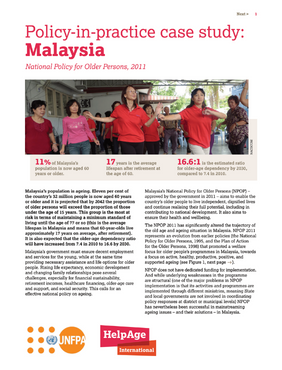
Malaysia: Policy-in-practice case study
The UNFPA Asia-Pacific Regional Office (APRO) in partnership with HelpAge International undertook a collaborative research project to identify and explore population ageing policy interventions that offer insights into potential good practice to support implementation and adaptation of ageing policies across the Asia-Pacific region.
This is the case study of national population ageing policy interventions in Malaysia.
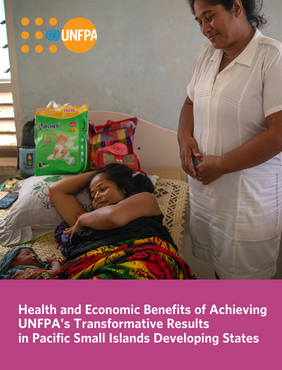
Health and Economic Benefits of Achieving UNFPA’s Transformative Results in Pacific Small Islands Developing States
This study focuses on tackling two of the most pressing national priorities for health and women’s economic empowerment and the realization of their human and reproductive rights in five Pacific countries. The Investment Case also provides evidence to governments, in the wake of the COVID-19 pandemic, or in the context of disrupted health systems due to the adverse effects of climate change or natural disasters, on how to prioritize health interventions and ensure the inclusion of family planning and maternal health services in essential health benefits packages and universal health coverage.
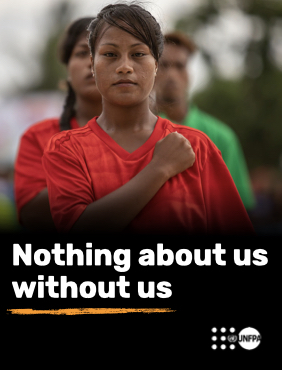
Nothing about us without us
Stories of youth-led transformations from across Asia and the Pacific.
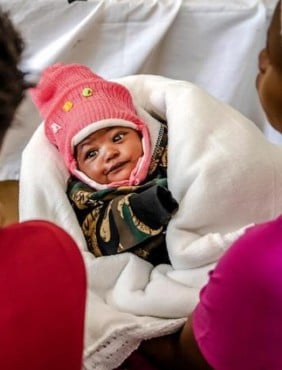
The Global Population Will Soon Reach 8 Billion—Then What?
Later this year, on 15 November 2022, the world population is projected to reach 8 billion. Seventy years ago, in 1952, it stood at 2.5 billion; and 70 years from now, by 2092, it will have grown by another 2.5 billion over current levels. Global population growth has been the overarching demographic story for decades and will remain a predominant trend for many years to come. Underneath this trend, however, lies growing demographic diversity.

Beyond Marriage and Motherhood
This paper builds on the first paper in series, Beyond Marriage and Motherhood: Patterns and Trends in Southeast Asia and the Pacific, by discussing a targeted approach to adolescent pregnancy, child marriage and early union. It explores evidence-based interventions to address adolescent marriages, unions and pregnancies and provides recommendations for tailored action, based on the respective drivers and context.

Beyond Marriage and Motherhood
This paper explores adolescent pregnancies, child marriages and early unions in Southeast Asia and the Pacific by investigating their prevalence, trends, drivers, patterns and typologies. It highlights that whilst there is considerable heterogeneity across the region, in many settings, progress to address these issues has stalled. The paper proposes the differing patterns of adolescent pregnancy, child marriage and early union observed require different intervention strategies. In doing so, it lays the foundation for the second paper in the series Beyond Marriage and Motherhood: Tailoring Programme Interventions for Southeast Asia and the Pacific.
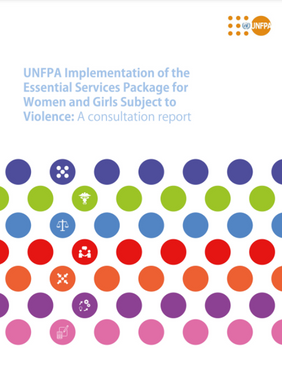
UNFPA Implementation of the Essential Services Package for Women and Girls Subject to Violence: A consultation report
The Essential Services Package (ESP) for Women and Girls Subject to Violence is a global guidance supporting national systems to respond to gender-based violence across four key sectors: health, social services, justice and police. The ESP guidelines include sector-specific modules for service provision, as well as a module on coordination, on implementation and a costing tool.
The ESP was launched as a UN Joint Global Programme in 2013. During Phase I (2013-2015), the ESP guidelines were developed and published in 2015. These were piloted in 10 countries during its second phase (2016-2019). Given the success and relevance of the guidance, UNFPA supported implementation in over 80 "self-starter" countries. Through a number of consultations with 120 staff members representing 62 countries, UNFPA took stock of progress in implementing the ESP. The consultations aimed at collecting successes and key lessons learned, understanding monitoring and evaluation processes, gathering experiences of GBV sector coordination in the context of the COVID-19 pandemic, and identifying needs and priorities for support during Phase III.
This report provides a summary of UNFPA key achievements in rolling-out the ESP, identifies good practices and outlines the key role the ESP has played in maintaining access to services for survivors during the pandemic and as part of the Spotlight Initiative. Furthermore, as a central tool for guiding safe, effective and comprehensive provision and coordination of services for survivors of GBV, the ESP has the potential to be expanded and strengthened during Phase III. In this report, UNFPA identifies nine areas for acceleration and provides recommendations for action to move it forward.
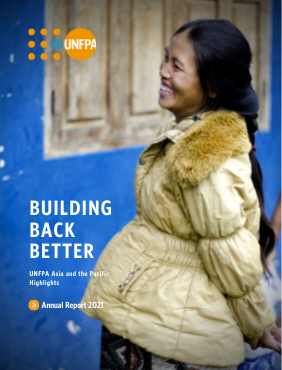
Annual Report 2021: UNFPA Asia and the Pacific
Despite a challenging year in 2021 and difficult working conditions, UNFPA across Asia and the Pacific, rose to the challenge by making significant progress towards our transformative results of zero maternal deaths, zero unmet need for family planning, and zero gender-based violence and harmful practices against girls and women. We continued to build resilient health systems, and lobby governments to keep their commitments to uphold universal sexual and reproductive health and rights by investing more in long-term social norm change to prevent gender-based violence and in ensuring gender inclusive population policies that are embedded in human rights.
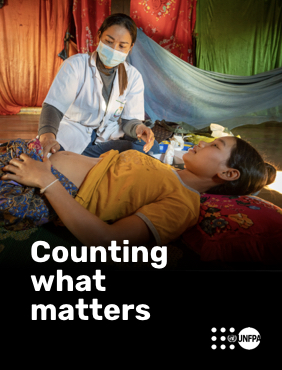
Counting what matters - MPDSR Report
The coronavirus disease 2019 (COVID-19) pandemic has significantly disrupted health services throughout the world, especially for maternal and newborn health. It is estimated that there will be significant increases in maternal and perinatal deaths due to the direct and indirect impacts of the pandemic. Addressing the impacts of the pandemic on sexual, reproductive, maternal, newborn, child and adolescent health has been a key focus of the United Nations Population Fund (UNFPA), with attention given to the protection of health personnel, the improvement of hygiene standards in facilities, and the maintenance of essential health services.
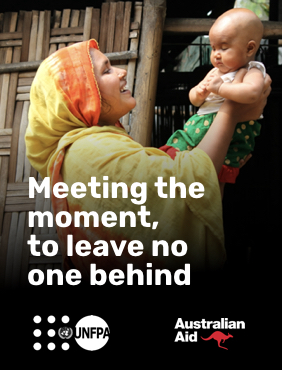
Meeting the moment, to leave no one behind - Digital Report
Meeting the moment, to leave no one behind
The COVID-19 pandemic swept through Asia and the Pacific bringing with it lockdowns, movement restrictions and curfews and disrupting essential sexual and reproductive health and rights and gender-based violence services. In this new landscape, UNFPA had to strengthen advocacy, boost innovation, adapt service modalities and leverage the power of technology to ensure continuity of essential services while at the same time protecting frontline health workers.
DFAT enabled the investment to quickly implement COVID-19 response activities to ensure continued and improved access to sexual and reproductive health and rights and gender-based violence services across the region in six priority countries, Bangladesh, Bhutan, Indonesia, Maldives, Nepal, Papua New Guinea and in the Pacific.
Highlights include:
-
133,072 people utilized integrated sexual and reproductive health services during the project implementation period across the project countries
-
248 service delivery points provided comprehensive gender-based violence service provision and referral mechanisms, including for mental health and psychosocial support across project countries
-
13,953 health care providers were provided with personal protective equipment across project countries
-
54 communications and advocacy materials on sexual and reproductive health and rights and gender-based violence were made available in local languages across project countries